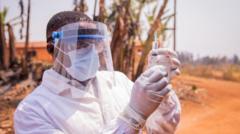How Did Vaccine Rollouts Lead to a 60% Drop in Deaths?

Understanding the Impact of Emergency Vaccination Programmes Against Major Infectious Diseases
In a world where infectious diseases can spread rapidly, the significance of emergency vaccination programmes cannot be overstated. A recent comprehensive study has shed light on the effectiveness of these vaccination initiatives in combating some of the deadliest diseases known to humanity. Over a period of 23 years, these programmes have reportedly reduced deaths by nearly 60% and prevented a similar percentage of infections. This article delves into the details of the study, its implications for public health, and the economic benefits of timely vaccination efforts.
The Study: A Groundbreaking Analysis of Vaccination Impact
The research, which is the first of its kind to assess the impact of emergency vaccination programmes systematically, focused on five major infectious diseases: Ebola, measles, cholera, yellow fever, and meningitis. Conducted between 2000 and 2023, the study analyzed 210 incidents across 49 countries, providing a holistic view of vaccination effectiveness in real-world scenarios.
Key Findings of the Study
- Reduction in Deaths: The swift rollout of vaccines has led to a nearly 60% reduction in deaths associated with these diseases.
- Prevention of Infections: The number of infections has also seen a significant decline, with a similar 60% reduction reported.
- Impact on Outbreaks: The rapid deployment of vaccines has been instrumental in halting potential wider outbreaks of these illnesses.
- Economic Benefits: The economic savings attributable to these vaccination programmes are estimated at $32 billion, primarily from averted deaths and years of life lost due to disability.
The Importance of Vaccination in Outbreak Scenarios
Vaccination during outbreaks is a critical strategy in public health. The study highlights how vaccines have not only saved lives but also averted the significant economic costs associated with widespread outbreaks. For instance, the 2014 Ebola outbreak in West Africa, which occurred before an approved vaccine was available, resulted in an estimated economic loss of over $53 billion for the affected countries. This stark figure underscores the importance of preemptive vaccination efforts.
How Vaccination Works During an Outbreak
Emergency vaccination programmes are typically implemented in response to an outbreak when the risk of disease transmission is heightened. Here’s how these programmes function effectively:
- Rapid Response: Health authorities can mobilize resources quickly to deploy vaccines in high-risk areas.
- Targeted Approach: Vaccination efforts are often focused on vulnerable populations, such as healthcare workers and those living in high-incidence zones.
- Community Engagement: Educating communities about the benefits of vaccination fosters trust and increases vaccine uptake.
- Monitoring and Evaluation: Continuous assessment of vaccination coverage and disease incidence helps fine-tune strategies and address gaps.
The Economic Case for Vaccination
The financial implications of vaccination programmes extend beyond immediate healthcare costs. By preventing outbreaks and reducing the incidence of disease, these programmes save billions in potential economic losses. The study estimates that the economic benefits of vaccination initiatives run into the billions, suggesting a significant return on investment for public health systems.
Breakdown of Economic Benefits
The economic benefits of vaccination can be categorized into several key areas:
- Averting Deaths: Every life saved translates into economic savings by avoiding costs associated with funerals, healthcare, and lost productivity.
- Years of Life Lost: By preventing disease and disability, vaccinations contribute to a healthier workforce, enhancing productivity and economic contributions.
- Healthcare Savings: Reduced hospitalizations and medical care costs alleviate the financial burden on health systems and taxpayers.
- Prevention of Economic Disruption: Containing outbreaks through vaccination prevents the broader economic fallout associated with public health emergencies.
Challenges in Securing Funding for Vaccination Initiatives
Despite the compelling evidence supporting the effectiveness and economic benefits of emergency vaccination programmes, securing funding remains a significant challenge. Organizations like Gavi, the Vaccine Alliance, play a crucial role in facilitating these initiatives. However, with global cuts to foreign aid, Gavi is currently seeking a new round of funding to continue its vital work in protecting communities worldwide.
Importance of Continued Support for Vaccination Efforts
Dr. Sania Nishtar, CEO of Gavi, emphasizes the necessity of fully funding vaccination programmes. She asserts that the study highlights the power of vaccines as a cost-effective counter-measure to the increasing risks of outbreaks. Continued investment in vaccination initiatives is essential for:
- Ensuring that communities remain protected from infectious diseases.
- Maintaining the momentum of successful vaccination campaigns.
- Preparing for future outbreaks and health emergencies.
Conclusion: The Future of Emergency Vaccination Programmes
The findings from this study are a powerful reminder of the critical role that emergency vaccination programmes play in safeguarding public health and economic stability. As we face an ever-evolving landscape of infectious diseases, the need for swift and effective vaccination responses has never been more pressing.
In light of these findings, it becomes imperative for governments, international organizations, and communities to advocate for and invest in vaccination initiatives. The lessons learned from past outbreaks can guide us in building a more resilient health system for the future.
As we move forward, the question remains: How can we ensure sustained support for vaccination programmes to combat emerging infectious diseases effectively?
FAQs
What are emergency vaccination programmes?
Emergency vaccination programmes are rapid responses implemented in the face of infectious disease outbreaks, aimed at protecting populations from severe illness and death through swift vaccine deployment.
What diseases are typically targeted by emergency vaccination programmes?
Emergency vaccination programmes commonly target diseases such as Ebola, measles, cholera, yellow fever, and meningitis, which have the potential for rapid spread and severe consequences.
How do emergency vaccination programmes benefit the economy?
These programmes prevent deaths and disabilities, leading to economic savings associated with healthcare costs, lost productivity, and broader economic disruptions caused by outbreaks.
Why is funding for vaccination programmes crucial?
Funding is essential to ensure that vaccination programmes can be implemented effectively, maintain community protection, and prepare for future health emergencies.
Vaccination is a powerful tool in our public health arsenal. As we strive to protect communities worldwide, it is essential to recognize the importance of timely vaccine roll-outs and the funding necessary to sustain them. How can we collectively advocate for better health solutions in our communities? #Vaccination #PublicHealth #GlobalHealth
Published: 2025-07-11 14:58:26 | Category: technology



